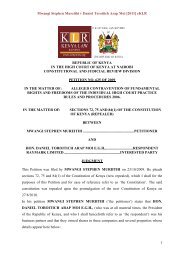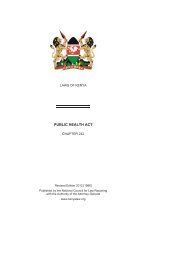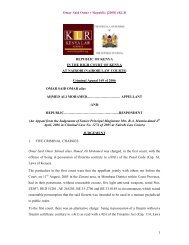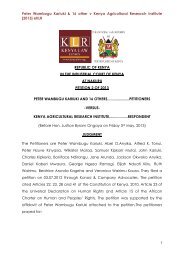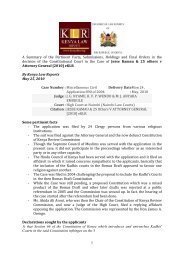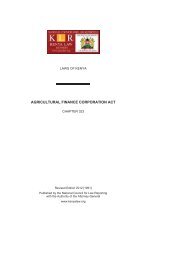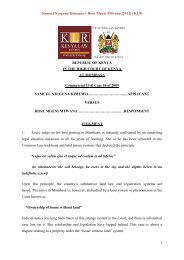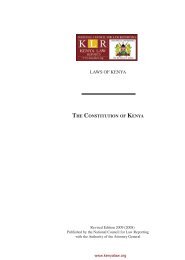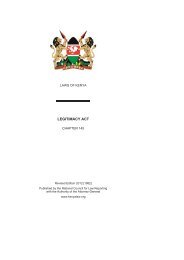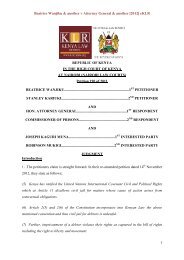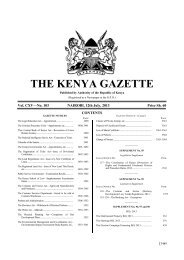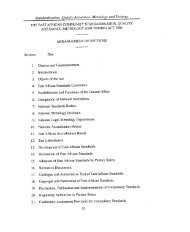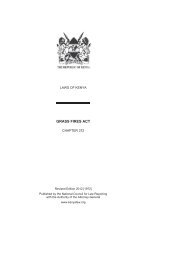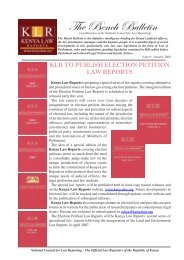Bench Bulletin - Issue 12 - Kenya Law Reports
Bench Bulletin - Issue 12 - Kenya Law Reports
Bench Bulletin - Issue 12 - Kenya Law Reports
You also want an ePaper? Increase the reach of your titles
YUMPU automatically turns print PDFs into web optimized ePapers that Google loves.
KENYA LAW REPORTS<br />
BENCH BULLETIN<br />
FROM THE COURTS — HIGH COURT<br />
15. Form 16As had to confirm to Regulation 35A at each polling station as they were to be scrutinized and relied<br />
upon by the Returning Officer to fill in Form 17A. Regulation 35 of the Election Regulation provided for the procedure<br />
to be followed by the Presiding Officer at the polling station culminating in the sealing of ballot boxes. These were<br />
very serious and onerous obligations stipulated by the electoral laws and could not be lightly shrugged off under the<br />
guise of human errors.<br />
16. There were arithmetical errors in the results of all the candidates in Form 17A. The results of two polling stations<br />
were not included and figures in respect of final tally of the results of the petitioner and the first respondent were<br />
altered without authenticating the same or by counter-signing. The figures of votes (cast, rejected and valid ones) were<br />
also not entered in respect of some polling stations, signature of candidates or agents were not shown. The Form 17A<br />
presented by the first Respondent was neither signed nor dated.<br />
17. The certificate of results issued by the second respondent declaring the first respondent as a winner was issued<br />
before the tallying process and form 17A were completed.<br />
18. All the undisputable facts lead to the conclusion that the second respondent did not perform her duties fairly and<br />
impartially. When a candidate was removed from the tallying centre at a very critical stage of the election process she<br />
failed to put it on record. She did not undertake her duties fairly and impartially.<br />
19. The process of the election, starting from the ferrying of ballot boxes to the whole process of receiving and<br />
tallying the ballot boxes in the tallying centre and declaration of the first respondent as a successful candidate did not<br />
demonstrate that there was a fair and free election.<br />
20. There was enough evidence to find that there were serious anomalies in the process of election results, which were<br />
fundamental and in the nature which would affect the results of the election. There was also evidence of non-compliance<br />
with important and mandatory provisions of the electoral law from the electoral officials and the court in all fairness<br />
had no option but to come to the conclusion that the parliamentary election was not fair, free and transparent.<br />
Petition allowed.<br />
Advocates :<br />
Mr. Omollo for the Petitioner<br />
Mr. Kilukumi for the 1st respondent<br />
Mr. lubullellah for the 2nd & 3rd respondent<br />
Criminal Practice: Defence of Retraction by Admission<br />
Josephat Njue Solomon v Republic<br />
Criminal Appeal 187 of 2008<br />
High Court at Embu<br />
W. Karanja. J<br />
April 22,2010<br />
Reported by Andrew Halonyere<br />
Criminal practice and procedure – charge – framing of a charge for the offence of defilement –appeal against conviction<br />
and sentence of life imprisonment on a charge of defilement – grounds; that the magistrates trial court omitted to record<br />
the language used during trial, words in the particulars of the charge i.e “unlawful carnal knowledge” were not envisaged<br />
in the Sexual Offences Act – court’s record showing that the appellant understood and participated in the proceedings<br />
- law on use of language in the course of criminal proceedings – whether the phrase “causing penetration with a child”<br />
and “unlawful carnal knowledge” described the same act.<br />
Criminal law – defilement – defilement of a girl under the age of 18 years – appellant raising defence of retraction by<br />
admission, by stating that “the girl was agreeable to what I did to her”- circumstances under which a retraction would<br />
arise – whether a minor can have consensual sex – whether the evidence adduced was sufficient to sustain a conviction.<br />
Evidence – documentary evidence – P 3 form – court’s discretion to call the maker of a document to adduce evidence -<br />
Sexual Offences Act (2006) section 8 (1),(2) - Penal Code (Cap 63) – Evidence Act (Cap80) section 77.<br />
The appellant was charged before the Runyenjes Senior Resident Magistrate’s Court with the offence of defilement<br />
of a girl contrary to section 8 (1) as read with sub-section 2 of the Sexual Offences Act (2006). He was convicted and<br />
sentenced to life imprisonment on his own plea of guilty. Being aggrieved with the conviction and sentence he filed an<br />
appeal against it in the High Court.<br />
The appellant submitted that the words used in the particulars of the charge i.e “unlawful carnal knowledge”, were not<br />
envisaged in the Sexual Offences Act, arguing that they were words in the repealed sections of the Penal Code (Cap 63)<br />
and therefore rendered the charge defective. It was also submitted that the plea was unequivocal because the appellant<br />
admitted to the facts but added the statement, “The girl was agreeable to what I did to her.” However, counsel for the<br />
state called this an attempt at justification and not a retraction of the admission. The appellant further submitted that<br />
60



